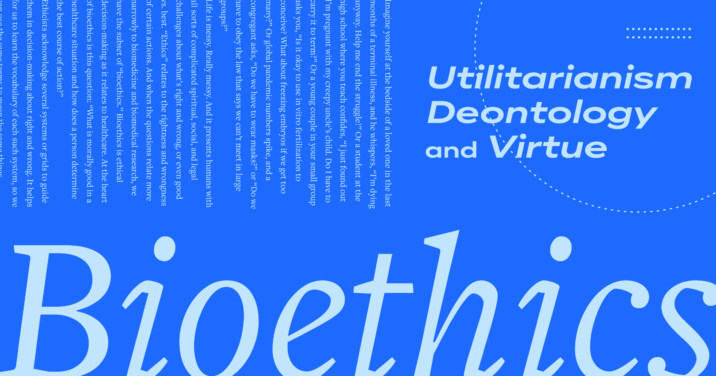Imagine yourself at the bedside of a loved one in the last months of a terminal illness, and he whispers, “I’m dying anyway. Help me end the struggle!” Or imagine a student at the high school where you teach confides, “I just found out I’m pregnant with my creepy uncle’s child. Do I have to carry it to term?” Or a young couple in your small group asks you, “Is it okay to use in vitro fertilization to conceive? What about freezing embryos if we get too many?” Or global pandemic numbers spike, and a congregant asks, “Do we have to wear masks?” or, “Do we have to obey the law that says we can’t meet in large groups?”
Life is messy. Really messy. And it presents humans with all sorts of complicated spiritual, social, and legal challenges about what’s right and wrong, or even good or best. “Ethics” relates to the rightness and wrongness of certain actions.
When ethical questions relate more narrowly to biomedicine and biomedical research, we have the subset of “bioethics.” Bioethics is ethical decision-making as it relates to healthcare. At the heart of bioethics is this question: “What is morally good in a healthcare situation and how does a person determine the best course of action?”
Bioethics is ethical decision-making as it relates to healthcare.
Ethicists acknowledge several systems or grids to guide them in decision-making about right and wrong. It helps for us to learn the vocabulary of each such system, so we can use the same terms to mean the same things. Although these systems are based on a worldview independent of God’s existence or action, in many instances they can still be compatible with Scripture.
The three dominant ethical systems are:
Utilitarian ethics
Utilitarianism is based on the end game. The results. In this system, the rightness or wrongness of any act is judged by the outcome; the outcome determines the morality of the action. Good results equals good moral action.
A key weakness is that such a focus on results can be reduced to “the end justifies the means.” Sure, doing the most good for the most people can be great. But it’s not always the best course. What about the shepherd who left the ninety-nine for the one? If data suggest face masks help ninety-nine people for every one person inconvenienced, why not give up some liberty for the sake of the large group?
As long as we remember the eternal perspective of God—that life extends beyond temporal existence, and suffering does not by definition end with mortal life—believers can contribute to the discussion using a utilitarian ethic.
Deontological ethics
The theory of deontology says that humans are morally obligated to act in accordance with a certain set of principles and rules regardless of outcome. The deontological system emerges from three critical tenets:
1. Motive
No action is considered intrinsically good. Rather, the motivation for the action in question must be “goodwill.” Something is determined to be moral if the action springs from noble intentions. An example would be Gentiles hiding Jewish people to save them from Nazis because they value human life and not so they can gain financially.
2. Duty
The second tenet is based on the moral obligation to “will the good” and to “do the good.” Again, this system is based not on the outcome or results or end in view, but because an action is one’s duty or the right thing to do.
3. Law
The third tenet is that the system reacts to law, a “categorical imperative,” that humans must act on what conforms to universal law.
Here’s the challenge. What constitutes universal law? Whose law are we talking about? And what if a given action violates civil law? Remember that time Peter and the apostles stood before the council, and the high priest asked why they disobeyed a strict order to stop teaching in Jesus’s name? Peter and the apostles replied, “We must obey God rather than people” (Acts 5:29). There’s the law and then there’s a higher law.
If the basis of rule or law resides in God’s commandments, the deontological ethic works because it emerges from biblical obedience. Of course, this is not how secular ethicists approach the various moral dilemmas. But a Christian motivated by love and obedience to God’s law could still claim a deontological ethic. God’s law says to do to others as we would have them do to us. And the reverse is true, as well. That is, if God’s law declares something immoral, such as keeping silent when we have a duty to speak, we know our silence is a sin of omission.
Virtue ethics
The Greek philosopher Aristotle spoke of a life shaped by justice and compassion. He is the father of the virtue-based system, in which the overriding concern is character. So the virtue ethicist asks, “What would a virtuous person do in this situation?”1 In a virtue-based system, it is not so much what one does but who one is, including moral virtues such as honesty, benevolence, kindness, and fairness as well as courage, patience, and endurance. Included within this system are the willingness to lower oneself to serve those of lesser socio-economic standing or intellectual ability, in addition to self-sacrifice, compassion, and integrity.
All that sounds great. Except that the virtue-based system can become arbitrary in the absence of an absolute standard of virtue. Over the past few decades, some actions previously viewed universally as being unvirtuous (polyamory, for example) are now acceptable to some—even some who claim to follow Jesus. Sexual perversions are now at times labeled “alternate lifestyle choices,” and those who champion them are considered heroes.
So the answer to “What would a virtuous person do?” depends on the virtuous person one has in mind. Dollywood sells T-shirts that ask, “What would Dolly do?” And in many ways, Dolly Parton lives an exemplary life. Other millionaires lay down hundreds of thousands of dollars launching rockets into space or exploring underwater ship wreckage, and that is their prerogative. Their actions may be entirely ethical. But are they virtuous?
In contrast, Dolly has worked to ensure that children receive a sound education, beginning at birth. Her Imagination Library has donated more than 200 million books to children worldwide. Still, Dolly herself would be the first to point to a yet more virtuous person as the ideal.
If virtue-based ethics makes us ask, “What would Jesus do?” we have the right idea. This system is perhaps the easiest to align with Scripture because believers have the perfect model of ethical living in the person of Jesus Christ—and because the Bible explicitly commends certain virtues, even “virtue” itself (2 Pet 1:5).
A treasured quality in the virtue-based system is humility. And the apostle Paul wrote to the Philippians extolling the humility of Christ in his incarnation, as he left the glory of heaven to take on human form (Phil 2). As to sacrifice, Jesus said, “Greater love has no one than this: to lay down one’s life for one’s friends” (John 15:13). And then he showed his perfect love by willingly laying down his life at the cross as a sacrifice. Asking the question, “What would Jesus do?” is a Scripture-based virtue-based ethics approach.
Bioethical principles
Now, having briefly outlined these major ethical systems, we can consider the four key principles (credited to Thomas Beauchamp and James Childress2) that are helpful to discussions on bioethical issues. These four are beneficence, nonmaleficence, autonomy, and justice.
- Beneficence asks, “Does it do good?”
- Nonmaleficence asks, “Does it avoid doing harm?”
- Autonomy asks, “Does it respect people’s rights to decide for themselves?”
- Justice asks, “Does it give what is right or due?”
What do these four principles of bioethics look like in action?
Let’s say I have a thyroid condition, but I refuse to take the prescribed pills. If my husband decided to sneak the medicine into my applesauce, is that action intended to do me good? Yes. Improving my health is a good goal, so the end is good. That’s beneficence.
Next, would the medicine do me harm? As best we know, my physician has determined I need it for good health. So, it will “do no harm” for me to receive it. That’s nonmaleficence.
Third, would my husband’s sneaking meds into my food violate my autonomy? It sure would! So, end of discussion. The action is deemed unethical. But we’ll keep going …
Last, is it legal or just for someone to give treatment to me or any adult without informed consent? Not in my state. Why? Because such an action (that my husband would never do, by the way) violates both autonomy and justice. Thus, it is determined to be unethical.
Other issues often considered as part of “beneficence” or doing good, and that may overlap with autonomy, include the following: confidentiality—keeping personal information secret, veracity—telling the truth; sanctity of life; medical benefit vs. futility; and resource allocation.
Scripture on bioethics
Foundational questions underlie the sorts of deliberations raised above. Scripture teaches that humans are made in the image of God and are thus of inestimable worth. So Christians value life. But how do we determine when one is prolonging life as opposed to prolonging death? Is there a difference between murder and killing, with the latter justifiable in times of war? We believe in mercy and the alleviation of suffering, but what if that involves killing? We do it for animals, but Genesis tells us that humans are different.
From the embryonic stage to end of life, humans face bioethical dilemmas about the best courses of action. And we have not even raised the more recent issues of cloning or transhumanism.
How then do we apply ethical principles and systems to the cases raised at the beginning of this article? Take the option to help a family member end his life in light of ethical systems that emphasize the end result, motive, duty, law, and virtue. Add to these doing good, avoiding harm, respecting autonomy, and acting as Jesus would act. What did you determine about ethical behavior?
Having done this work, we must factor in that good people will disagree. Otherwise, we’d have no dilemmas! But good people disagreeing is nothing new. Consider that the apostle Paul said some people ate meat sacrificed to idols because they believed idols weren’t real, while others refrained from doing so out of reverence toward the one true God (1 Cor 8). Paul concluded that the two groups of worshipers needed to respect each other and seek to avoid violating each other’s consciences.
So, a good goal for godly people relating to bioethics is avoiding an approach that says, “Here’s the right conclusion for everyone for all situations.” Rather, we help ourselves and others to prioritize Scripture as we seek appropriate action. It helps to know where Christian consensus exists in key areas, but it’s also important to extend grace.
The Spirit on bioethics
Bioethics involves truth intersecting life in the realm of healthcare. And for followers of Christ that truth is the absolute of God’s Word applied to daily healthcare dilemmas. As believers, we must seek to interpret and obey Scripture when confronted with dilemmas not specifically addressed in the Bible. But in this we have an advantage absent in all of the above-mentioned systems or principles: the help of the Holy Spirit. God has promised his children that we each have a personalized guide—himself.
So as we encounter questions about “pulling the plug” at a bedside or crisis pregnancies in the classroom, in a small group or in one-on-one conversations, we have Scripture to guide us and the Holy Spirit to help us. The questions will often bring us to our knees, but we plead with one who listens and cares. And equipped with language to build bridges with those around us, we have the unique opportunity in our pain and theirs to introduce image-bearers to the most virtuous life ever lived—and who still lives.
Related articles
- What Makes Christian Ethics Truly “Christian”? A Seminary Prof Answers
- Holiness: A Short Guide to a Complicated Doctrine
- Sermon on the Mount: 5 Keys That Unlock Understanding
- What Speak Truth in Love Means—and Doesn’t Mean

- Aristotle himself didn’t craft the question, “What would a virtuous person do?” He would have been more likely to ask, “What customary practices and character qualities should I cultivate given the ends I am trying to reach?” Still, Aristotle did articulate the virtue-based foundation on which today’s ethicist builds.
- Principles of Biomedical Ethics, 8th ed. (Oxford: Oxford University Press, 2019).






